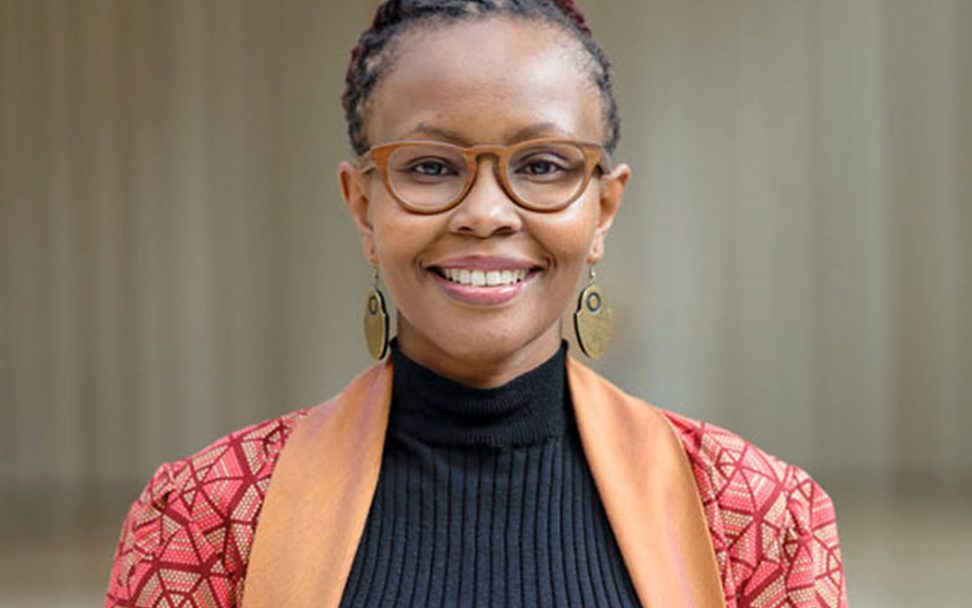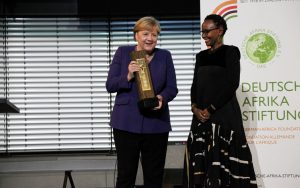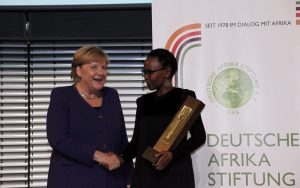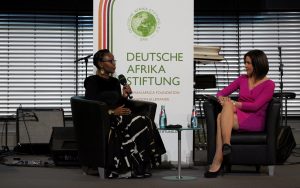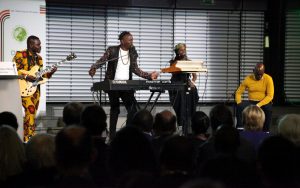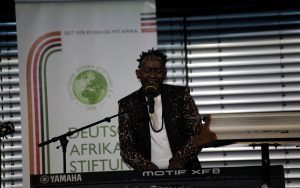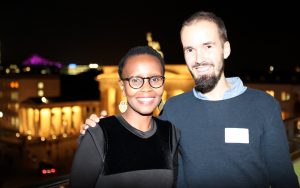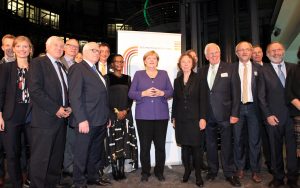On the evening of 23 October, German Federal Chancellor Angela Merkel presented the German Africa Award 2019 to the pioneer of the digital revolution, Juliana Rotich. “You have shown outstanding social sensitivity and entrepreneurial skills, especially with regard to the digital progress in Africa”, emphasised Chancellor Angela Merkel at the award ceremony in front of more than 300 invited guests from politics, business and society at the Allianz Forum in Berlin. At the ceremony, the 42-year-old Kenyan was honoured for her outstanding social entrepreneurial commitment by the German Africa Foundation.
As co-founder of the open source platform Ushahidi, Rotich has revolutionised the global flow of information. With a unique blend of social activism, citizen journalism, and geo-information, Ushahidi enables its users to upload events and locate them both geographically and temporally. Today, Ushahidi is used for crisis response and demand of public accountability in over 160 countries, reaching millions of people.
Rotich is also co-founder of the technology company BRCK, which has been the largest public Internet provider in sub-Saharan Africa since February 2019. BRCK developed a battery-powered multi-connection device that ensures smooth data flow in crisis areas. The advice provides internet access via various channels and can be used up to eight hours even without electricity. The technology is now used in 150 countries and is available in 48 languages.
For Juliana Rotich, the social benefits are always at the centere of technological innovation. The world-renowned IT expert shows how technological innovation can contribute to the development of the African continent. She demonstrates that digital products made in Africa can not only compete on but also conquer the global market. Thus, she is the face of a young, successful Africa that is actively shaping the world of the 21st century.
The welcoming speeches by Dr Coenraad Vrolijk, Regional CEO Africa of Allianz SE and Dr Uschi Eid, President of the German Africa Foundation were followed by a short documentary about the work and visions of Juliana Rotich, produced by Deutsche Welle. The laudatory speech was held by Jury President Claus Stäcker, before Chancellor Angela Merkel handed over the Award statue. Both emphasised Rotich’s extraordinary commitment, which significantly contributes to technological innovation and the development of the continent, always focusing on the social benefits. In the following discussion with ZDF news-anchor Kay-Sölve Richter, Rotich talked about her projects, the challenges she had to face as African woman in the IT sector as well as the importance and opportunities of digitalisation for both Kenya and other African countries. The successful evening was accompanied by Kenyan artist Eric Wainaina and his band.
Background on Ushahidi
By using crowdsourcing, Ushahidi software enables a unique blend of social activism and public accountability. As open source software, it gives everyone the opportunity to make events and offences, such as electoral fraud, corruption or human rights violations, accessible to others online in real time on a map. The software was developed ad hoc during the 2008 elections in Kenya, when several riots and acts of violence were recorded. Eyewitnesses were able to send text messages and e-mails to Ushahidi (in English witness report), which placed them on a Google map, resulting in a visual record of what happened. This method is also called crisis mapping. Originally planned as a one-off project, the further developed software has already been used in more than 160 countries. It has been used, for example, during the Obama campaign for the presidential election in the US in 2012, in the 2015 earthquake in Nepal to improve the coordination of aids or to document sexual harassment of women.
The aim of the platform is to enable users to interact, communicate and share data. This software, which is also technically easy to use, is designed to remove barriers to civil society involvement and facilitate activism. In this way, Ushahidi can lead to more transparency, demand for rights and public discussion.
The non-profit technology company is based in Nairobi and has employees in nine countries. It was founded by Juliana Rotich, Erik Hersman, Ory Okolloh and David Kobia. Through the unique combination of social activism, citizen journalism and geo-information, Ushahidi has become one of Africa’s leading technology companies. Juliana Rotich, who also co-founded BRCK, is still on the board of Ushahidi and is in demand as an IT expert worldwide.
Background to BRCK
BRCK is a Kenyan technology company which has been the largest public Wifi provider in sub-Saharan Africa since February 2019. The company was founded in 2013 by co-founders of Ushahidi, including Juliana Rotich. BRCK developed a battery-operated multi-connection device that uses various channels to provide Internet access that is available for eight hours even without electricity. Thus, Internet access can be ensured even in crisis regions or areas with poor infrastructure. The advanced development of the BRCK prototype, SupaBRCK, a combination of server, modem, and storage, even allows operation with solar energy.
The company is using its development to provide access to the digital world to the widest possible audience. Through BRCK, many buses, bus stops and stores in Kenya are equipped with free Internet access financed by advertising. With about 2,000 public hotspots and half a million users per month, BRCK opens a new dimension of connectivity. To ensure that children and young people in particular benefit from the educational opportunities on the Internet, there is also the offshoot BRCK Education: Here, for example, a tablet suitable for children was developed which, together with teaching content that can be stored in SupaBRCK, transforms classrooms into digital classrooms.
The mission of BRCK is to provide developing countries, so-called border markets, broadly with Internet access. This is based on the belief that the next three billion Internet users will come from border markets.
The multi-connection device is now used in 150 countries and available in 48 languages.
